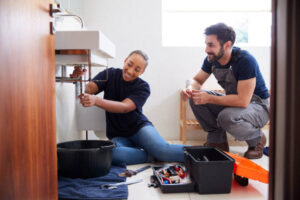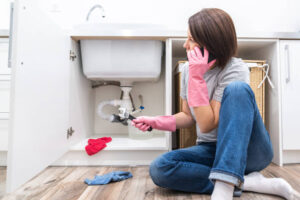Imagine yourself cooking dinner in the kitchen and beginning to smell somewhat like gas. One begins to show early mistrust of difficulties. A gas stove leak repair is not merely another domestic chore; if you ignore the right line of action, it can be a serious issue. Gas leaks pose a concern. From them can follow fires or explosions. Until fixed, they could disrupt your weekly cooking calendar. This is a matter needing fast responses and logical thought.

Let us begin now with what to do should you discover a gas leak. First, let out a small breath. Panic never helps in this kind of moments. Stay composed and act quickly. Steer clear of trying to solve everything on your own if you’re not confident about the proper response. Imagine changing a flat tire without a jack. One would not eat a lead balloon. Moreover dangerous is to try to patch gas leaks without the required knowledge.
The first priority is cutting off the gas supply. Usually, the main gas line valve allows you to do this. Usually found in your residence next to your gas meter or similar conveniently reachable position, this valve is It’s smart to find where it is before you start smelling difficulties. In this manner, you won’t be running about when the problem demands a quick reaction. One minute lost can raise safety issues.
Let us now break out the elements of a proper gas leak repair. You have to find the leak’s source. Sometimes the leak falls near to your stove. Other times one could find it in the connecting pipes. You will find help from your eyes and hearing. Look for uneven flame colors or hiss if your stove is turned on. They can be subdued signals that things are not exactly right. Ever notice how you feel when you smell gas—like you have entered a mystery novel? That tells you to pay closer attention.
One usually falls from seeking a quick fix using household equipment. That approach is like laying large bets in a creaky old horse wager. Better better, you should call on professionals ready to control this kind of risk. Gas specialists carry trade tools. Their sophisticated detectors and understanding of quick and safe leak correction methods Their involvement can make all the difference between an accident just waiting to happen and a perfect repair work.
Sometimes a near-miss in the kitchen becomes a story your grandchildren will know. Once a friend of mine felt he could mend his own leaky stove. One evening he heard a faint hiss and, curious, experimented with the controls. Wide awake, he sat in the dark drinking cold water that night while listening to the squeaks and groans of his gear. His awareness helped him to see the risk involved in the do-it-yourself approach was not justified. Sometimes lessons show themselves as smoking kitchens and scared neighbors.
Extra safety measures really pay off. Cut the gas line then constantly open a window. Let fresh air clear any last traces of scents. You actually need that release, even if opening Pandora’s box could feel like it. This is a basic activity during any breach. It very literally cleans the air; after all, breathing clean air shouldn’t be a luxury.

What could keep you out of greater trouble? a detector of a gas leak. These small gadgets stop if they smell gas. They are like that trustworthy friend that always looks out for you no matter what. Modern detectors can provide loud alarms should gas levels rise. This enables quick response. Just as sensible as learning your way around a fire extinguisher is putting one in your kitchen.
In the real world today, time is everything. If you ever smell gas consistently, go directly out of the kitchen. Never turn on any electrical device—especially one that might spark. Try not to carry your phone near the likely leak. Think of gas as a clever liar; a small spark can ignite a big flame. Once you are safe, phone a local emergency agency or a gas repair company. Quick reaction helps to prevent a major disaster that can wipe off more than just your dinner.
Safety-wise, you would find fascinating how these repairs are done. First professionals take into account the degree of the leak. They use specifically designed sensors to track gas escape. This approach feels like detective work. They use clues the leak provided to find the source. They then pressure test and, if needed, apply recovery pumps. Although it seems difficult, this is a comprehensive therapy and you can be confident the experts know their craft.
One property owner described his experience over a steaming cup of coffee after a gas leak scare. He claimed he felt as though he was negotiating a hurricane without a compass. The surprise knock on his door by a technician felt like a lighthouse of hope among the shadows. With his precise directions and cool head, the technician came back from almost paralysing fear. “Follow my lead,” the technician advised, and that simple direction helped to control an apparently disastrous scenario. This was a moment that underlined the need of obtaining the right help—even if it is more difficult said than done.
Think about including regular housekeeping including gas leak repairs in it. Like cleaning the filters on your automobile or oiling your bike chain, regular inspections help to avert Danger Day. A smart homeowner reminds herself annually of gas pipe and appliance inspections. Wear and tear over time can cause rather obvious cracks. A careful visual check can identify rust or leakage. Still, you should not try any repairs yourself if you lack confidence. Instead, get a second opinion from people who work full-time on gas systems.
Some would contend that if a gas leak is discovered early enough, a temporary remedy will be sufficient. Although in some instances that may be true, before beginning any work it is advisable to learn correct safety precautions. If let to fester, even a small leak can create problems. I often tell people that ignoring a gas leak is rather literally like playing with fire. Every moment counts so every precaution should be given careful thought.

Let us not undervalue the necessity of routine kitchen safety inspections. Spend a minute each few months checking over your stove and its connections. Search for worn-through or cracked hoses. investigates the fittings closely. Although at first look the damage might not be clear-cut, little fissures might eventually widen out. Frequent inspections help to keep a steady leak from turning into a tragedy. It is akin like spotting a leak in a boat early—patch it up before you sink.
It can be difficult at times to distinguish whether you are analyzing a small fragrance or a serious hazard. If you’re unsure, it’s best to get outside and investigate. Test a safe distance scent. This may be awkward, like a personal sniff test nearly. Still, safety always takes front stage. When the gas stink doesn’t go away, it’s time to reach for the phone and seek help. You really should rely mostly on your intuition.
I recently visited a couple who started a weekly ritual in their new kitchen following a minor leak problem. Their game grew out of cooperative safety assessments. They would examine the stove one day and then the pipes. Their banter about “sniffing out trouble” and “the adventures of the gas detective” was abound. Though that sounds odd, along the process they gathered a lot of expertise. Their fun attitude to security improved the quality of life in their house.


